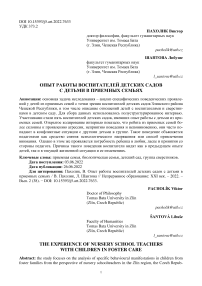The experience of nursery school teachers with children in foster care
Автор: Pacholk Viktor, Antov Libue
Журнал: Непрерывное образование: XXI век @lll21-petrsu
Рубрика: Кадровые и методические ресурсы непрерывного образования
Статья в выпуске: 2 (38), 2022 года.
Бесплатный доступ
The study focuses on the analysis of specific behavioural manifestations in children from foster families from the perspective of nursery schoolteachers in the Zlín region, the Czech Republic. The main objective was to analyse these manifestations in the nursery school environment. A sub-objective was to describe the relationship of these children with their teachers and peers in the nursery school. A semi-structured interview was used for data collection. The participants were five nursery schoolteachers who had experience of working with children from foster families. Open coding of the interviews revealed that children from foster families were more likely to display aggression, rejecting behaviour and defiance. These behaviours are perceived by teachers as a means of releasing psychological tension, a way of attracting attention or inappropriate habits from the family environment. However, at the same time, the need for love, affection and acceptance from the teacher is noticeable. Teachers see the reasons for this behaviour in the children's previous experience and in the current life situation and its changes. Children from foster families often enter into conflict situations with other children in the class. There is a difference in relation to younger or weaker children, to whom they manifest empathy, effort to help or care for them.
Foster care, biological family, nursery school, peer group
Короткий адрес: https://sciup.org/147237922
IDR: 147237922 | УДК: 373.2 | DOI: 10.15393/j5.art.2022.7633
Список литературы The experience of nursery school teachers with children in foster care
- Bolwby J. Separation Anxiety: A critical review of the literature. In: Journal of Child Psychology and Psychiatry. 1960. 1 : Vol. XLI. P. 251‒269.
- Grohová J. Dítě v náhradní rodině potřebuje i vaši pomoc!: informace a pracovní listy pro pedagogy. Prague : Středisko náhradní rodinné péče, 2011. P. 42.
- Helus Z. Úvod do psychologie. Prague : Grada, 2018. P. 310.
- Collective of authors Dobrý pěstoun: náhradní rodinná péče v ČR. Tábor : Asociace poskytovatelů sociálních služeb ČR, 2018.
- Koluchová J., Matějček Z. Osvojení a pěstounská péče. Prague : Portál, 2002. P. 155.
- Langmeier J., Matějček Z. Psychická deprivace v dětství. Prague : Státní pedagogické nakladatelství, 1963. P. 279.
- Lynch Frances [et al.]. Cost Effectiveness of a School Readiness Intervention for Foster Children. In: Children and Youth Services Review. 2017. 81 : Vol. 6.
- Matějček Z., Dytrych Z. O nevlastních dětech a nevlastních rodičích. In: Československá psychologie. 2000. 3: Vol. 44. P. 193‒201.
- Matějček Z., Dytrych Z. Děti, rodina a stres: vybrané kapitoly z prevence psychické zátěže u dětí. Prague : Galén, 1994.
- Matějček Z. a Dytrych Z. Nevlastní rodiče a nevlastní děti. Prague : Grada, 1999.
- Matějček Z. Náhradní rodinná péče: průvodce pro odborníky, osvojitele a pěstouny. Prague : Portál, 1999.
- Matějček Z., Bubelová V., Kovařík J. Pozdní následky psychické deprivace a subdeprivace. III. část: Děti narozené z nechtěného těhotenství, děti z dětských domovů a děti z náhradní rodinné péče v dlouhodobém sledování. In: Československá psychologie. 1996. 2: Vol. 40. P. 81‒94.
- Pazlarová H. Pěstounská péče: manuál pro pomáhající profese. Prague : Portál, 2016. P. 255.
- Procházka M. Sociální pedagogika. Prague : Grada, 2012. P. 203.
- Schofield G., Beek M. Attachment Handbook for Foster Care and Adoption. London : CoramBAAF Adoption & Fostering Academy, 2018.
- Sychrová A. Pedagogické aspekty náhradní rodinné péče. Pardubice : University of Pardubice, Faculty of Philosophy, 2015.
- Trnková L. Náhradní péče o dítě. Prague : Wolters Kluwer, 2018.
- Vágnerová M. Vývojová psychologie: dětství a dospívání. Prague : Charles University, Karolinum Press, 2012. P. 531.
- Zezulová D. Pěstounská péče a adopce. Prague : Portál, 2012. P. 197.


